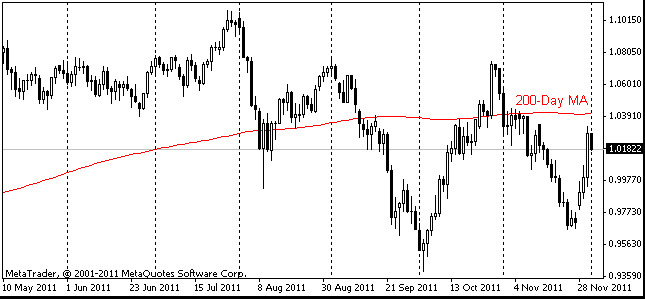EUR/usd
On Friday the single currency continued to rally and reached 1.3485. The growth was supported by positive expectations in regard to Europe, as well as by the trigger of stop orders in the euro short positions. The impulsive rise in the single currency may hold for some more time, but it is unlikely to last for long. Now Spain steps onto that very spiral Greece has been lately moving along. The Spanish government more and more realizes its inability to fulfill the budget plans. Haircuts have just begun. Nevertheless, the markets mostly ignore this fact, being happy with the g20's promise to increase the firepower of international lenders up to $2 trln over the next two months. One thing is of interest – who will pay for this? By the way, the major developing countries (BRICS) are said to negotiate in detail the foundation of a bank for developing countries at the G20 meeting. It seems that the dynamic economies are not willing to participate in financing of the troubled euro area and prefer to focus on the growth in their own states and on the cooperation with other developing countries. However, one of factors sparking off the euro rally was China's statement about its readiness to provide the euro area with greater support. China heavily depends on the investor sentiment, so it is the country's vested interest to maintain as much stability as possible in the euro zone, with which it has very close trading relations. Stock markets today will seek to take profits after a week of remarkable growth, which may eventually lead to the euro correction and drive the currency down to 1.34. However, there will surely be some more attempts to break above 1.35 this week.

GBP/USD
Britain's Chancellor manifested its firm stance towards tax cuts and stimulation of the economic growth through government spending. Osborne stated that the government does not have money for this and that the responsibility for making money, investments and creating jobs now lies with the private sector. His viewpoint is reasonable, especially taking into account that it goes in line with the BoE's soft policy, thanks to which the funding of the economy keeps lower than it could be under other circumstances. In fact, rigid spending control is a very uncommon and praiseworthy approach now, which both the U.S. and Continental Europe lack and which Japan cannot afford. The sterling performed a remarkable growth on Friday and returned to the area of local highs. As has already been mentioned, the Bulls won't give up attempts to break through the 200-day moving average. Now the currency pair is trading close to that mark, around 1.59.

USD/JPY
The Japanese yen is now making some attempts to slow down after a three-week accelerating growth. Markets don't sell the yen very willingly, since the stock markets today are geared up for correction after the previous impressive rally. Despite the force with which USD/JPY has been growing over the last three weeks, it is not possible to say that the rate sets new records. The rates close to 81 made the trading levels of October 2010 – July 2011. And this time the pair may need a break to get a toehold in this area.

AUD/USD
Despite the success of the single currency and the yen sales (which usually causes growth of AUD/JPY), the Australian dollar remains in the sideways. This is a result of the political uncertainty which has been weighing on the country until recently. The intraparty voting showed a much stronger support for current Prime Minister Gillard than for former Premier Rudd. Let us remind that one of the most prominent proposals of the latter was the introduction of taxes on the ‘super-profits' of commodity companies, which could quite negatively affect the exporters' state of affairs.
